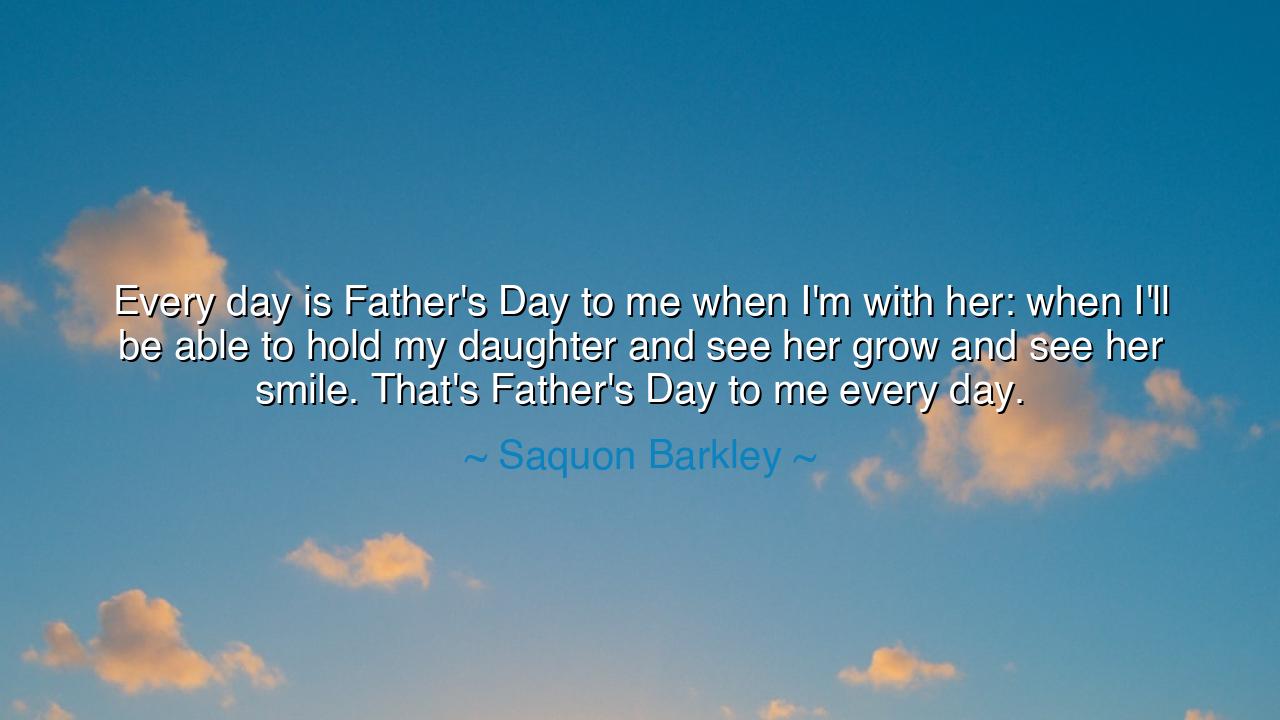
Every day is Father's Day to me when I'm with her: when I'll be
Every day is Father's Day to me when I'm with her: when I'll be able to hold my daughter and see her grow and see her smile. That's Father's Day to me every day.






The words of Saquon Barkley resound with the tenderness of a father’s heart: “Every day is Father’s Day to me when I’m with her: when I’ll be able to hold my daughter and see her grow and see her smile. That’s Father’s Day to me every day.” At first, it seems a simple declaration of love, yet beneath it lies a profound teaching—that the truest festivals are not bound to the calendar, but to the living moments of love we share with those dearest to us. To hold one’s child, to watch her smile, to see her grow: these are not once-a-year events, but sacred gifts renewed with every sunrise.
The meaning here rests in the understanding of fatherhood not as a title marked by ceremony, but as a daily practice of presence. Barkley refuses to confine his joy to a single holiday; instead, he proclaims that every embrace, every glance, every shared moment is a celebration in itself. His words reveal that love is not measured by rare occasions but by constancy—a thousand small moments that, when strung together, form the crown of a parent’s life.
The ancients too spoke of this truth. Consider Marcus Aurelius, emperor of Rome, who though weighed down with the burdens of war and rule, still took joy in the quiet presence of his children. In his writings, he reminded himself that greatness lay not only in conquest, but in gentleness toward those entrusted to him. Like Barkley, he understood that the daily tenderness of a father’s gaze is more enduring than any public honor. What use is one grand festival if the heart neglects the daily duty of love?
Barkley’s words also remind us of the power of the smile—a child’s smile that renews strength, that dissolves weariness, that reminds a parent why their sacrifices matter. To see that smile is to be repaid tenfold for sleepless nights, for labor and worry. It is a mirror reflecting the father’s love back to him, purified and innocent. In this way, Barkley teaches us that joy is not abstract—it is tangible, alive, found in the luminous faces of those we cherish.
The origin of this wisdom lies in the natural bond between parent and child. From the dawn of humanity, fathers and mothers have drawn meaning from the growth of their children. Warriors returning from battle, farmers weary from their fields, kings weary from their councils—all found their greatest festival not in public triumph but in the laughter of their households. Barkley’s words are but a modern echo of this eternal truth: the home is the holiest temple, and the smile of a child is its prayer.
The lesson for us is clear: do not wait for appointed days to honor those you love. Do not confine gratitude to holidays nor affection to anniversaries. In practice, this means cherishing the everyday—sharing meals, listening to stories, giving time freely, and holding those dear with attentiveness. To live as Barkley teaches is to make every day a holy day, every ordinary moment a sacred festival.
So let this teaching be carried into your own lives: do not ask when the day of celebration is, for it is today. The Father’s Day, the Mother’s Day, the Day of Love—these are not bound by dates, but renewed each time we honor our bonds with presence and joy. In this way, life itself becomes a chain of holy days, each one sanctified by the smiles of those who walk beside us.
Thus, children of tomorrow, learn from Saquon Barkley: to hold your loved ones close, to treasure their growth, to rejoice in their smiles. If you live so, then every day will be a festival, every moment a song of gratitude, and your life will not be measured in years or titles, but in the enduring light of love shared daily.






AAdministratorAdministrator
Welcome, honored guests. Please leave a comment, we will respond soon